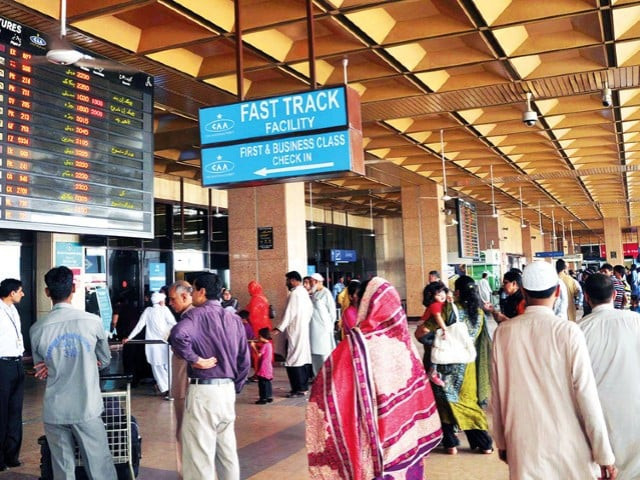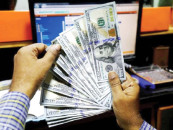Manpower exodus tops 615,000 amid barriers
Tough migration rules, belittling treatment, offloading add to workers' misery

Pakistan's manpower exports climbed over 615,000 in the first 10 months of 2025, but the record outflow masks deepening challenges faced by workers seeking opportunities abroad. Despite rising demand in Gulf markets, thousands of Pakistanis continue to battle complex visa requirements, tighter documentation rules, frequent rejections, and heightened airport offloading, obstacles that often turn already desperate economic migration into a punishing ordeal.
Pakistan's export of manpower to international markets reached 615,055 by the end of October 2025, reflecting a robust average of 61,505 workers leaving the country each month, according to the official data released by the Bureau of Emigration and Overseas Employment (BEOE). In comparison, 727,381 Pakistani workers moved overseas in 2024, marking an average monthly outflow of 60,615.
Saudi Arabia continues to dominate as the leading destination, absorbing 431,545 Pakistani professionals and skilled workers during the first 10 months of 2025. Qatar and the United Arab Emirates followed with 53,103 and 36,433 arrivals, respectively, further solidifying the Gulf region's role as a primary hub for Pakistani manpower. Sadiq Nawaz, a Saudi Arabia-based strategic finance expert and emerging-market workforce analyst, said that the kingdom's demand for foreign talent, particularly in technical and skilled professions, has grown substantially.
Saudi Arabia is undergoing a massive transformation through multibillion-dollar development projects. This has opened doors for professionals worldwide, including Pakistan, he said. "Pakistanis are increasingly securing positions not only in government entities and multinational firms but also in Pakistani companies that have recently expanded operations into the kingdom," he added.
Highly skilled Pakistanis contribute far more than remittances, as they bring expertise, innovation, and global networks, he said and added that by investing in structured, high-skilled migration, Pakistan can enhance its economic resilience and accelerate national development. Pakistan's worsening economic conditions are driving record numbers of people abroad, yet those seeking livelihoods face mounting obstacles at every step of the migration journey. Visa and documentation processes remain daunting, with applicants struggling through confusing requirements, inconsistent scrutiny, and frequent rejections.
Even valid labour visas are sometimes ignored, pushing many to attempt riskier routes through third countries. New 2025 mandates, including additional certifications for job seekers, have further tightened access at a time when inflation and unemployment are pushing families to borrow heavily for overseas opportunities.
Airport offloading has also intensified, disproportionately targeting individuals under 30 and leading to devastating financial losses as borrowed money for tickets, visas, and agent fees, often running into hundreds of thousands of rupees, cannot be recovered. Skill mismatches worsen the challenge, as weak CVs, generic applications, lack of certifications, poor English proficiency, and limited technical training hinder competitiveness in Gulf and European markets.
Many Pakistanis, already underprepared by an outdated education system, end up earning less than workers from China or India. Exploitation and abuse remain widespread in Middle Eastern countries. Despite the government's digital reforms, experts argue that stronger protections, targeted training, and fairer emigration policies are urgently needed. Remittances from Pakistani workers remain a strong support for Pakistan's economy. Between January and October 2025, overseas Pakistanis sent home $7.9 billion.
Pakistan can significantly strengthen its global standing by creating skill-matching frameworks with Saudi Arabia, Australia, and the UK, promoting innovation-led training programmes, aligning labour strategies with sustainability and digitisation trends, and supporting diaspora-led investments and public-private partnerships, said Nawaz.
Outside the Gulf region, Pakistani migration to developed countries continues steadily, with 3,726 workers heading to the United Kingdom and 833 to the United States. These destinations typically attract highly qualified professionals, although many Pakistanis initially relocate for higher education and subsequently transition to employment through post-study or specialised work permit programmes.
Immigration expert Abu Bakar Adil, Director of Operations at Superior Consulting, emphasised the economic value of highly skilled Pakistanis who migrate through structured, skill-based pathways. "Professionals from sectors such as IT, engineering, and healthcare not only excel in global markets but also contribute significantly to Pakistan's economy through stable, long-term remittances," he said.
Adil urged the government to streamline and regulate the immigration process more effectively, ensuring that qualified Pakistanis can pursue global opportunities safely and legally. He also stressed the importance of professional guidance from experts well-versed in international immigration laws and ethical standards. Such measures, he suggested, would strengthen Pakistan's access to global labour markets and help maintain a steady inflow of remittances.























COMMENTS (1)
Comments are moderated and generally will be posted if they are on-topic and not abusive.
For more information, please see our Comments FAQ